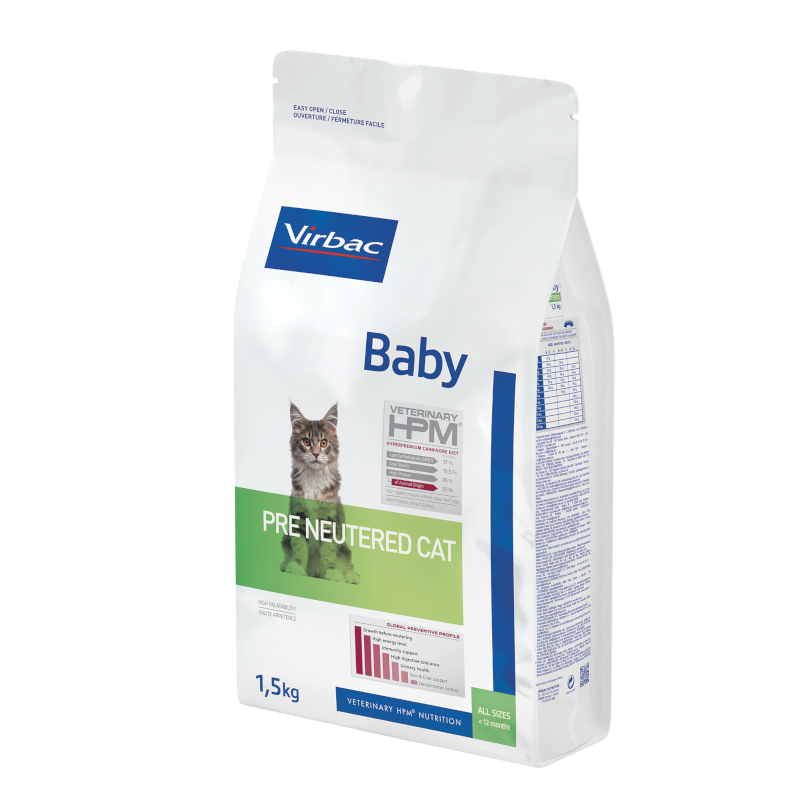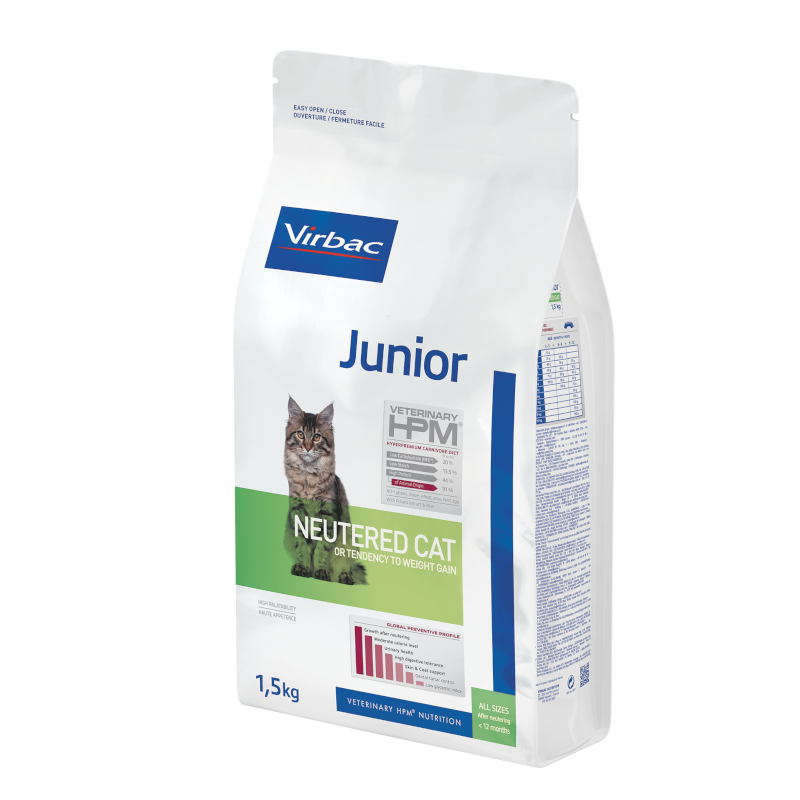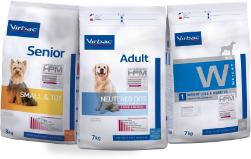
Offer your kitten the best start in life!
Growth is a key period for your kitten’s health
During their growth, puppies have very precise nutritional needs that have to be strictly fulfilled.
Kitten’s growth is very intense. On a 12 months period, your kitten’s weight will be multiplied by 50. In comparison, a human’s weight is multiplied by 20 in 18 years.
At the same time, the kitten’s health is fragile. His immune system and digestive system are immature.
Find more about the optimal nutritional support
That’s why it is very important to choose a high quality complete and balanced diet for your kitten.
 Be vigilant : any nutritional mistake could threaten your kitten’s future adult health!
Be vigilant : any nutritional mistake could threaten your kitten’s future adult health!
Vegetarian diets, as well as raw meat diets, are unadvisable for kittens.
Nutrition plays a key role during this period
GOOD NUTRIENTS IN APPROPRIATE QUANTITY
Apart from your love and care, your puppy needs a precise balance of specific nutrients to grow well.
-
High quality Proteins to ensure the growth of bones, muscles, skin and coat, and support immunity.
-
Very few Carbohydrates, as his still immature digestive system is not able to assimilate them properly.
-
A balanced supply of Minerals to build a healthy bone structure.
-
Essential Fatty Ccids (DHA) to support cognitive development.
NUTRITIONAL REQUIREMENTS ARE DIFFERENT BEFORE AND AFTER NEUTERING
At 3 months, a kitten has twice the energy needs of an adult cat (at equal body weight). That’s why, before neutering, your kitten needs a diet that provides very high energy and fat in small portions.
Neutering, which usually takes place around 5 months of age (*), reduces energy requirements and increases appetite. That’s why it’s essential to modify your kitten's diet after neutering, in order to reduce energy intake and avoid overweight. At 1-year-old, if nothing has been done to restrict their caloric intake, neutered kittens can be 25 % heavier than entire littermates.
In order to protect the kitten’s health and to prevent early obesity development, a close attention must be paid to the growth curve. Obesity is highly prevalent in cats, and recent studies show that the trajectory to obesity is determined early in life, even before neutering. Weigh your kitten every 2 weeks and follow his weight curve. Weight should grow in a smooth and regular way.
More information on the impact of neutering
 Warning : Reducing the ration is not a good solution. This can induce begging behavior as well as nutritional deficits. Your cat must receive all the nutrients essential to its health in sufficient quantities.
Warning : Reducing the ration is not a good solution. This can induce begging behavior as well as nutritional deficits. Your cat must receive all the nutrients essential to its health in sufficient quantities.
Unless your kitten reaches 12 months, switching to adult food after neutering is not a good solution. Neutering usually takes place at 5 months of age and, at this age, the kitten has reached only 65% of total growth. He still needs a diet formulated to cover growth needs.
The solution is to switch to a diet specifically designed for kittens after neutering.
With VETERINARY HPM® growth program, give them the best start in life
Our nutritional program is specially designed to match your kitten's needs all along growth, from weaning to adulthood, before and after the growth peak.
All our diets are made with high quality ingredients and follow Low carbohydrate High Protein concept of formulation, thus ensuring the respect of your kitten’s nature as carnivore.
BABY FOR THE FIRST PERIOD, BEFORE NEUTERING
At weaning, start with VETERINARY HPM ® Baby cat, which is specifically formulated to cover the intense needs of growth before neutering:
- Highly Energetic and Highly Digestible, to cover their intense needs through small rations.
-
High level of highly Digestible Proteins, 90% of animal origin, to support the development of muscles and bones. Proteins associated with Betaglucans also support immunity.
-
Reduced level of Carbohydrates (Starch) combined with added lactobacilli and bentonite allow to cope with their immature digestive system and reinforce digestive comfort.
-
Balanced Minerals (Calcium and Phosphorus) to ensure healthy bone development.
-
High quantities of Essential Fatty Acids (DHA) to support brain and cognitive development.
JUNIOR, AFTER NEUTERING AND UP TO 12 MONTHS OF AGE
At neutering, change to VETERINARY HPM ® Junior Cat.
VETERINARY HPM ® Junior Cat meets the requirements of growth and take into consideration the changes induced by neutering :
-
Less important level of energy and fat than in Baby, because the energy need decreases after neutering. This is key to avoid the development of fat mass and overweight. This allows to maintain ration size and cope with increased appetite after neutering.
-
High level of highly digestible animal origin proteins, to promote muscle mass development and support immune system.
-
Reduced level of carbohydrates (starch), for digestive tolerance.
Do's and Don'ts
 Weigh your kitten every 2 weeks and follow his weight curve.
Weigh your kitten every 2 weeks and follow his weight curve.
 Regularly check and adapt the ration according to your puppy’s weight. If you have any difficulties or questions, contact your veterinary clinic.
Regularly check and adapt the ration according to your puppy’s weight. If you have any difficulties or questions, contact your veterinary clinic.
 Strictly follow the daily ration advised. Offering food free choice, excessive daily rations or above caloric needs, especially when a diet has a high fat content, favors the development of obesity and osteoarticular disorders.
Strictly follow the daily ration advised. Offering food free choice, excessive daily rations or above caloric needs, especially when a diet has a high fat content, favors the development of obesity and osteoarticular disorders.
 Raw meat (Barf) or vegetarian diets are strictly inadvisable for puppys. Such diets can cause major nutritional deficiencies with serious consequences on health.
Raw meat (Barf) or vegetarian diets are strictly inadvisable for puppys. Such diets can cause major nutritional deficiencies with serious consequences on health.
 Do not give leftover food that is too fatty, salty or sweet.
Do not give leftover food that is too fatty, salty or sweet.
 Do not add mineral and vitamin supplements.
Do not add mineral and vitamin supplements.
 Don’t feed your kitten with an Adult dog food.
Don’t feed your kitten with an Adult dog food.
Read more about the best practices when you bring your kitten home

Because correct nutrition is first of all a matter of health, VETERINARY HPM ® is available from veterinary practices (or the Virbac Web Store). Our stockist locator helps you to find in one click your nearest Veterinary practice stockist which either proposes our nutrition or to buy online.





